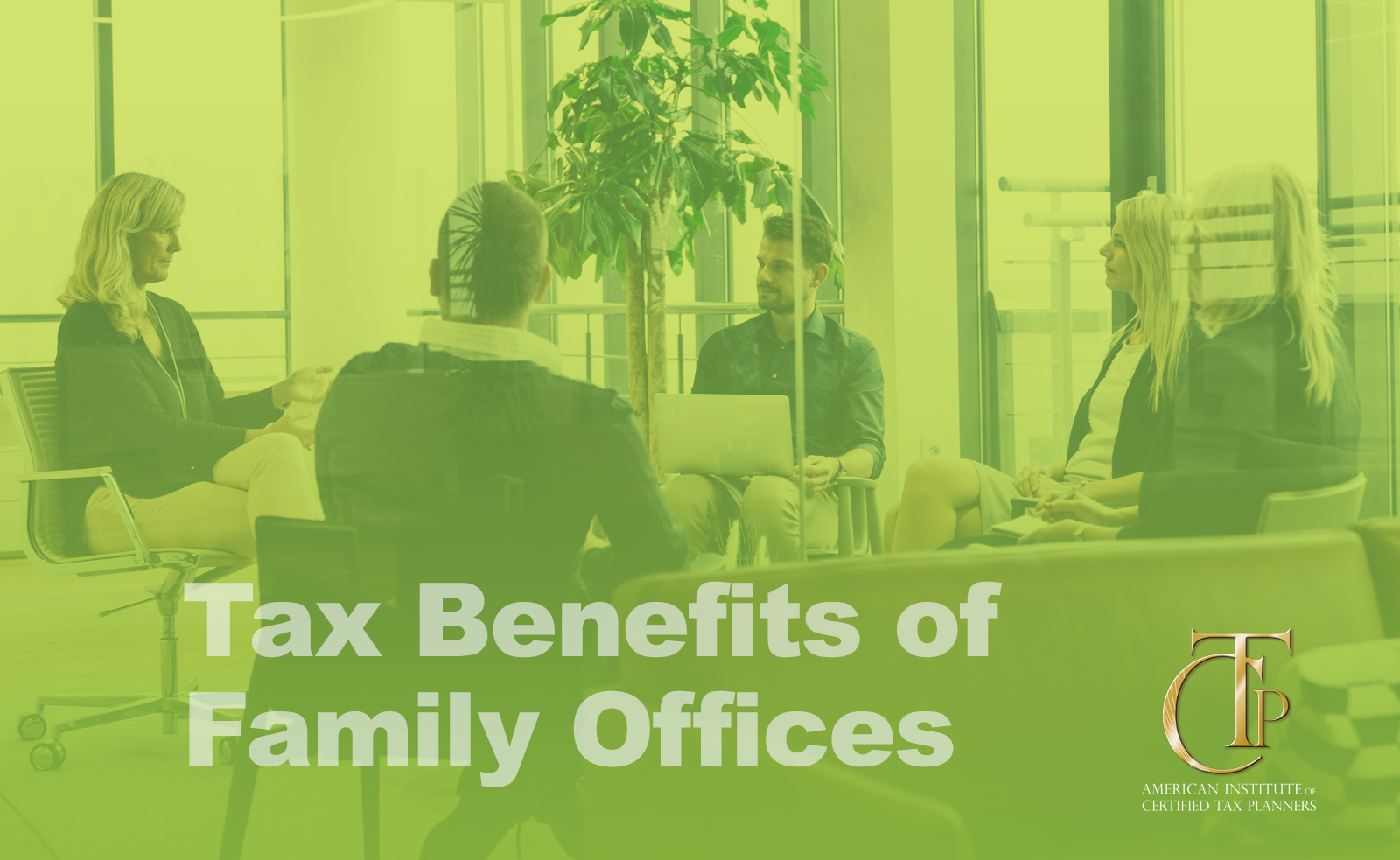Established, wealthy families have long leveraged the concept of a “family office” to preserve their wealth, ensure business succession, establish governance and control, and foster their family legacy. This type of specialized company has been gaining popularity—and many of them have been on the lookout for a tax planner to complete their financial advisory teams.
What exactly is a family office? A family office focuses on managing the wealth and the personal affairs of a family, typically through the services of a large CPA firm. Their financial team often helps the family manage their real estate, businesses, trusts, and other assets. However, a family office is an expensive setup—which is one of the reasons a tax planner can be a value-add to this team. Taxpayers with family offices are on the lookout for tax savings opportunities, especially since a key tax break disappeared with the Tax Cuts and Jobs Act (TCJA). Prior to TCJA, taxpayers with a family office could use miscellaneous itemized deductions to write off things like investment expenses and tax return preparation fees. The deduction covered the portion of these expenses that exceeded 2% of their adjusted gross income. With the implementation of TCJA, that deduction has been suspended until 2026. If the TCJA provision is not extended, the opportunity to claim a deduction could become available within less than two years.
In the interim, taxpayers have been searching for other means for deducting high investment expenses. One strategy some taxpayers began to employ was to form a family management company and deduct the management expenses under Code Section 162 for ordinary and necessary expenses. However, this begs the question: “does the family office function in such a way that it actually qualifies as a business?” As tax planners are well aware, the IRS does not look kindly upon entities that are created for the sole purpose of tax avoidance. The only way to benefit from the “ordinary and necessary expenses” deduction is to function as a true business.
What are the factors at play in determining if a family office is a business? Let’s say that we have multiple families that are pooling their resources together to create a syndicate. They establish one LLC, but within that LLC are cells that help protect the other participants. However, the purpose of the main management company is to leverage the costs of the family office. Could this be considered a trade or business? The IRS may see these management services as a personal expense, since the family is the owner—in which case the costs would not qualify for a deduction.
How can a family qualify as a trade or business? For guidance, tax planners can look to two key court cases in which a family office attempted to claim that business deduction—and either failed or succeeded. These cases are known as Higgins and Lenders.
Court Case #1: Higgins v. Commissioner
This definitive court case occurred back in 1941 and defined the official perspective on family offices for decades. The Supreme Court determined that merely managing and monitoring your own investments does not qualify as a trade or business for tax purposes. The whole point of the family office is that the family members do not want to do the work of managing their investments and financial planning, so they hire a firm to take care of it. If their participation does not meet IRS standards, they cannot deduct the business expenses related to that family office. This case set the standard for many years that the typical family office could not claim that Code Section 162 deduction.
Court Case #2: Lender Management v. Commissioner
The Higgins case defined how family offices were viewed from a tax perspective until 2017 when the Lender Management case arose. This family was the owner of Lender’s Bagels, and they had a family office that managed their own investments—and yet they met the qualifications for a trade or business. What was different?
First, Lender Management employed a “fund of funds” hedge fund model to oversee the investments of the Lender family’s LLCs. The company also provided personalized investment advisory and financial planning services to individual family members but not all family members. Because of this setup, the company was not merely managing its owner’s assets. The assets being managed actually belonged to a number of different people including siblings, children, and grandchildren within the Lender family. Though one family member held a 99% profits interest in Lender Management, that person held no more than an 11% interest in any of the LLCs holding the investment assets. That was key in establishing Lender Management as a qualified business: the ownership of the business entity did not match the ownership of the assets that were being managed. You can see how this could happen with multiple families participating in a series LLC. Each family will want to own its own assets even though they are protected under the same LLC. So in the Lenders’ case, we end up with a structure that is much more similar to a true business.
Secondly, family investors were allowed to withdraw their investments at any time (keeping liquidity constraints in mind) if they were dissatisfied with management. There was no obligation that Lender Management must indefinitely manage the assets in the investment LLCs. This setup created a business-like arm’s length relationship between the family members and the entity Lender Management.
Lender Management also employed three full-time employees and a number of part-time workers during certain periods. Its principal, Keith Lender, was a third-generation family member with a business degree from Cornell University and an MBA from Northwestern University. Lastly, the business entity itself was compensated through a profit’s interest rather than merely receiving a standard investor’s return. Taking all these factors together, the court determined that Lender Management met the qualifications for a trade or business.
Summary
Tax planners can add tremendous value to a family office by offering insight on what needs to be in place to take advantage of certain tax breaks. Notable among these is the Code Section 162 “ordinary and necessary expenses” deduction, which may be available to a family office that functions as a true business. The expert advice of a tax planner can help family offices make more informed decisions on how to structure their company in the most tax advantageous way. The tax planner can then benefit from a stable client relationship that could span multiple generations. To learn more about how to advise your business clients and expand your client base, sign up to become a certified tax planner.





